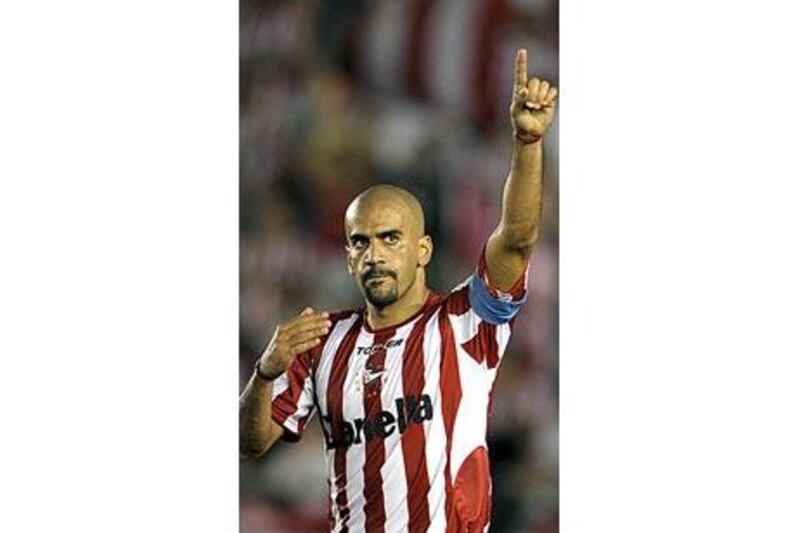"There, things are more structured," says Juan Sebastian Veron of the European Champions League. "But it's hard to find the passion for football that we live in South America." This is a man who can back up his opinion with experience, a midfielder who spent a decade in Europe. Though English fans might class his time with Manchester United and Chelsea a disappointment, his stock remains high in Italy.
Before moving to the Premier League, he shone with Sampdoria, Parma and Lazio, where he was the key player in a rare title win. And after leaving England he was a valued member of the Inter Milan squad. He could still be there now, earning a fortune and rubbing shoulders with the game's elite; moving back to Argentina in 2006 was his decision. "It was a family thing, " he says, "a desire to return to my country. Thanks to football I don't need to play, and on that basis I was able to make my choice."
It was not a hard choice to make. Veron went back to Estudiantes of La Plata, an hour's bus ride away from the capital Buenos Aires. It was a decision based on passion, as Veron made clear recently when he accepted a 40 per cent pay cut to ease the club's financial position. His blood probably flows with white stripes amid the red, the colours of his team. He not only started his professional career with Estudiantes, he lived much of his youth at the club.
His father, Juan Ramon, was the star man four decades ago when the provincial club sprung a huge and prolonged upset by winning the Copa Libertadores, South America's premier club competition, three times in a row. "The love I feel for the club has developed over time, there's no doubt that the fact that my father played for Estudiantes left me with few alternatives," he says. "It's a feeling that comes partly from him, and the history of those years, and also from spending so much time at the club. I trained at the club from the age of five, during the holidays I went to summer camp there, I used to go to the stadium - I practically lived there."
In England, Veron found it hard to establish an emotional connection with his surroundings. He perhaps suffered from joining a United side that had become used to major conquests - so much silverware had been won that a new trophy hardly seemed to excite anyone. At Estudiantes it was different. He drew strength from the energy of the terraces, from the drumbeats and chants that make football in Argentina such a special occasion, and his return was an instant success.
His midfield gunmanship was vital as Estudiantes won the 2006 Apertura, their first national championship since 1983 and only their fourth ever - with two tournaments a year since the early 90s it meant that the club went empty handed through 40 of them, including a spell in the second division. The leader of the side, Veron is now 34 - but Argentina's coach Diego Maradona was surely correct when he phoned the player in the dressing room after an impressive club performance to say that he was showing the vitality of a 22 year old. Maradona sees Veron as a key figure in next year's World Cup campaign.
Veron's biggest regret in football is that he has never won a major title with his country - South Africa should give him one final chance to put that right. First, though, comes the Club World Cup. Just as he did by leading Estudiantes to the Libertadores title - a final victory over Brazilian side Cruzeiro in July which saw them qualify for Abu Dhabi - Veron will once again seek to emulate his father.
Juan Ramon scored a vital goal at Old Trafford as the 1968 model Estudiantes overcame Manchester United to win the old Intercontinental Cup, at that time contested on a home and away basis between the champions of Europe and South America. Veron believes that the values of his father's generation form a permanent legacy at the club. "It is what they lived, and above all what they have transmitted and left behind," he says.
"This club has a special mentality in decisive matches. It's a club for the big finals. "What for others might be a burden for us is an advantage, because of the values the shirt stands for. The old champions have transmitted to us the importance of sacrifice, work, confidence and the humility of not thinking yourselves champions before the game has been played. " This is especially important in a competition like the Club World Cup, as Veron is keen to stress. "If we want to beat Barcelona we will have to play the perfect match, because the whole story can be defined in one move," he says.
But true to the ethos of the club, he is anxious that a victory over Pohang Steelers in tomorrow's semi-final should not be taken for granted. "We're all thinking about the final, but there's a step that we have to take before that, and we'll have to be careful," he adds. They are the words of an experienced team leader, and perhaps a future president of Estudiantes de La Plata. sports@thenational.ae





